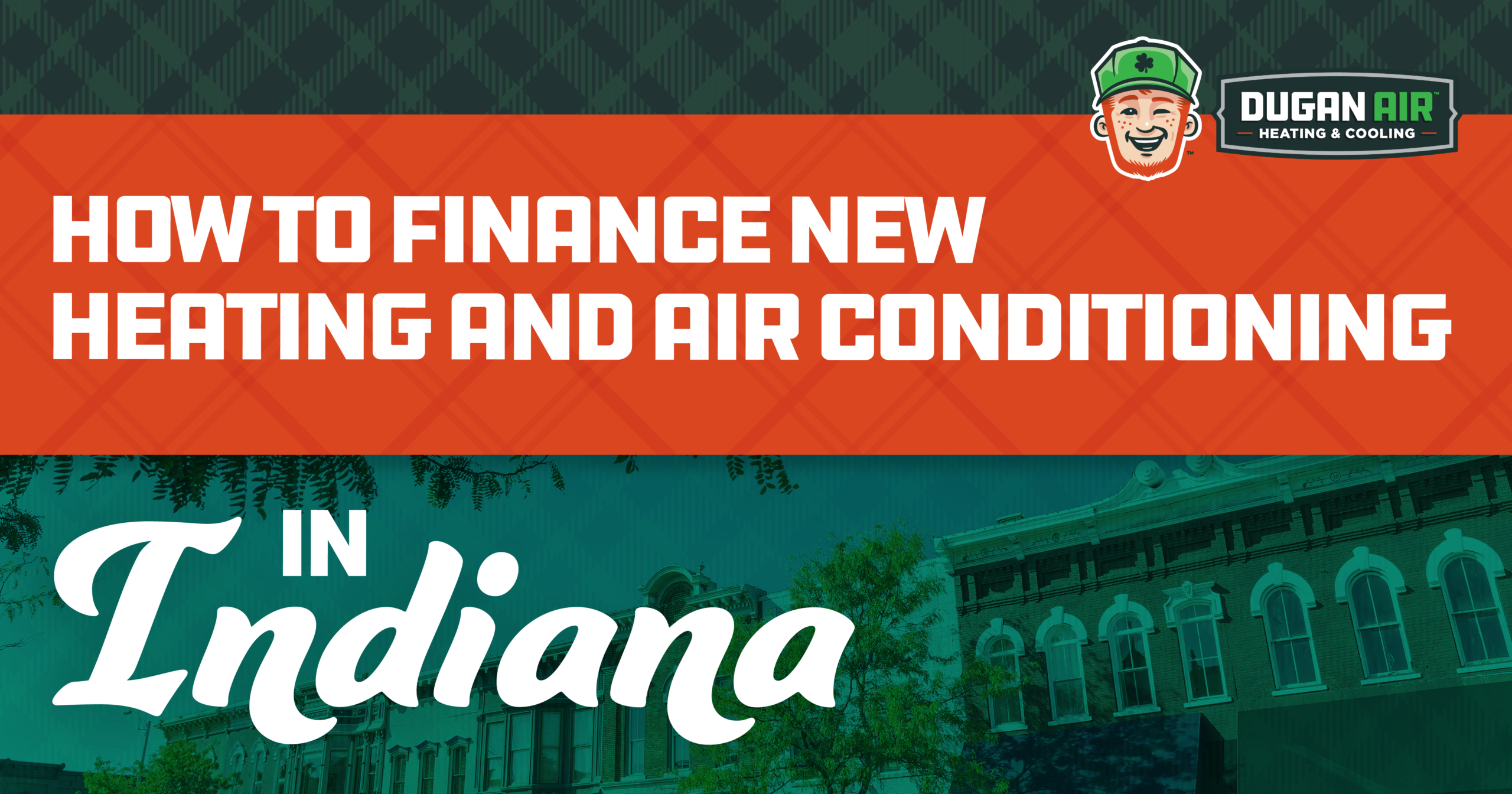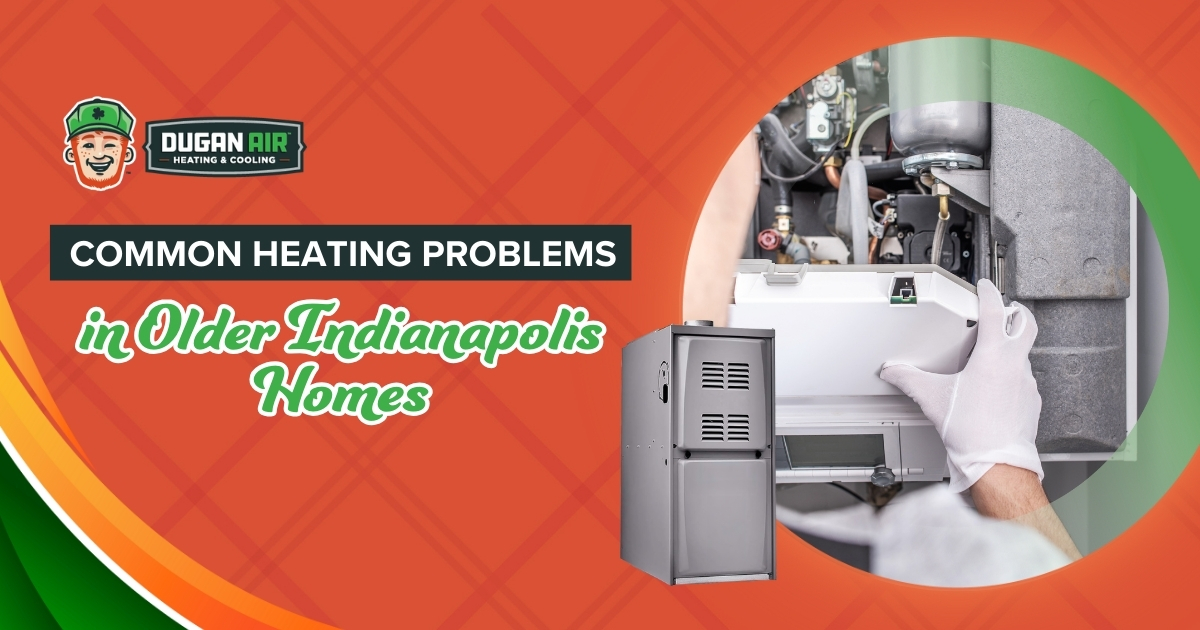Why Does My Furnace Leak Water When the AC is Running?
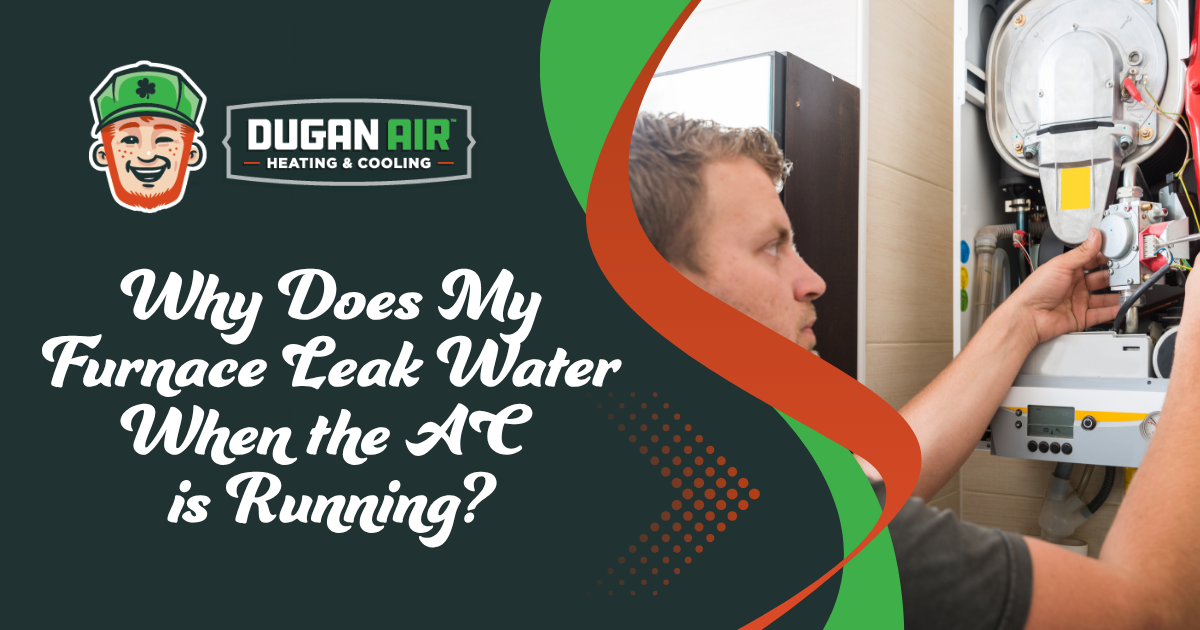
As the summer temperatures begin to heat up in Indiana, you’re likely using your air conditioner more and more. But if you turn on your AC one day to find water leaking out of the nearby furnace, it can be confusing and concerning. While it may appear that water is pooling out of your furnace, the problem is likely within your cooling system.
Clogged drain lines, frozen coils, or excessive humidity can cause your AC’s drainage system to become overwhelmed, resulting in water backing up and eventually leaking around the furnace. In this guide, we’ll walk you through the most common causes of your furnace leaking water when the AC is on, as well as signs it’s time to call the experts at Dugan for emergency HVAC repair.
Common Causes of Furnace Leaks When AC Is On
If you notice your furnace dripping water whenever the AC is on, there’s likely a condensation problem within your system. To keep your home cool, your air conditioner pulls humidity from the air, turning it into water and draining it away through the condensate drain line. If any component in the drainage system malfunctions, water can overflow into the unit, and your AC may begin leaking water from the bottom.
Because furnaces and air conditioners often share space, especially in combined HVAC systems, leaking water can appear to be coming from either unit. If a blockage occurs in the drainage system, it can cause water to pool around the furnace, even though the actual problem is with your AC.
Here are some of the top reasons your air conditioner may not be draining properly:
- High humidity: During periods of excess humidity, your air conditioner produces more condensation than usual, which can overwhelm the drain line and lead to leaks.
- Clogged drain line: If debris, rust, or sludge builds up in the drain line, it can block water from flowing out and cause it to back up into the system.
- Frozen evaporator coil: Several issues can cause the evaporator coil to freeze and thaw, leading to excess condensation and potential leaks.
- Disconnected drain line: If the drain line becomes disconnected from the drain pan or AC unit, water may leak out around the furnace.
- Drain pan damage: Cracks or damage to the drain pan can prevent it from holding water, allowing condensation to drip into the unit or onto the floor.
Signs the Leak Needs Professional Attention
If water is pooling around your furnace, there are a few troubleshooting steps you can take to determine whether it’s time to call a professional. Begin by turning off your HVAC system to prevent more water from spilling out and damaging your home or belongings. Then, check the following to try to diagnose the underlying problem:
- Inspect the condensate drain line for blockages or damage.
- Check the air filter for buildup and replace it with a new one if necessary.
- Look for signs of freezing or ice buildup on the evaporator coils.
- Make sure the drain line is properly connected to the drain pan and AC unit.
If you have trouble or still can’t identify the culprit, call a trusted HVAC company like Dugan for repair. An experienced HVAC technician can assess your unit, diagnose the issue, and recommend the best solution to stop the leak and get your system back in working order.
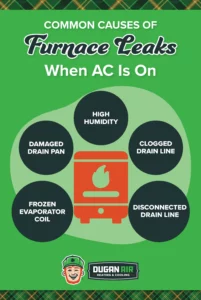
How To Prevent Furnace Leaks from AC Issues
Once you repair your HVAC system, it’s important to take steps to prevent future leaks from recurring. Professional maintenance is the best way to catch these potential problems early on, before they cause damage to your home, health, and unit.
Before heating and cooling seasons begin, schedule a routine tune-up to have a pro inspect, clean, and service your system. They’ll perform essential maintenance tasks, such as cleaning the coils and changing the air filter, and address any minor problems before they progress.
A few other ways you can prevent leaks include:
- Changing the air filters every one to three months, depending on your usage.
- Using a damp cloth to clean the evaporator coils every few months to prevent dust buildup.
- Making sure all air vents are open and unobstructed to allow for proper airflow.
- Checking the drain pan for cracks, rust, or other damage and replacing it if necessary.
- Flushing the drain line with a mixture of water and vinegar to prevent clogs and buildup.
If you notice any leaks or other warning signs, such as unusual noises, odors, or reduced airflow, contact a professional for repair as soon as possible. Addressing these issues early helps prevent costly repairs, water damage, and system breakdown.
Call Dugan for HVAC Repair in Franklin!
If you notice water leaking near your furnace or air conditioner, the team at Dugan Air Heating and Cooling is here to help! Our licensed HVAC experts can quickly diagnose and repair the underlying problem to prevent damage to your home and unit. With quick response times and lasting solutions, you can count on our team to keep your system leak-free.
Call us or book online to schedule a heating or cooling repair today! We proudly serve homeowners and businesses in Franklin, Columbus, Whiteland, and surrounding areas.
Frequently Asked Questions
Can a leak in my AC really damage my furnace?
An air conditioner leak can damage your furnace if it gets inside the unit. Water exposure can cause electrical problems, rust, and corrosion. Over time, the moisture can also lead to component malfunctions, mold growth, or even complete system failure.
Is it safe to keep using the AC if water is leaking near the furnace?
No, if your air conditioner is leaking water near the furnace, immediately turn it off until our team determines the underlying cause. Continuing to use your AC can cause the leak to worsen, leading to costly repairs, system failure, and potential damage to your home and belongings.
Can I unclog the condensate drain line myself?
While you can try to unclog the condensate drain line using a wet/dry vacuum, it’s best to leave repairs to our experts. Our pros have the training and experience to properly inspect, clear, and prevent clogs in your drain line.
What are the dangers of air conditioner leaks?
Aside from the problems they can cause with your AC unit, leaks can cause significant damage to your home and belongings. Without immediate repair and cleanup, water damage can lead to warped floors, stained walls, and structural issues. Over time, moisture can also create the ideal environment for mold growth, which affects indoor air quality and poses serious health risks.
Is it possible that the leak is coming from my furnace?
If your furnace has a built-in humidifier or clogged drain pan, it may be the source of the leak. However, if only your air conditioner is on at the time of the leak, it’s most likely coming from your cooling system.

HOW CAN WE HELP?
Request Service Mobile
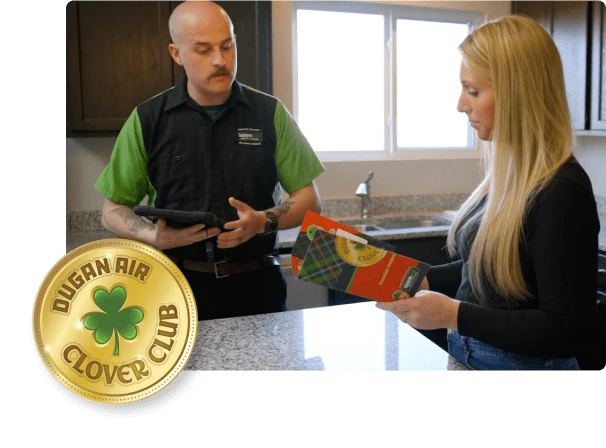

Join Our Premium Clover Club
Take Advantage of Our HVAC Maintenance Plan
Have you ever wondered if a service plan is really the pot of gold it’s rumored to be? Trust us — ours is! Signing up for a Premium Clover Club membership includes the following perks:
- Annual heating and cooling checks
- Discounts on repairs and parts
- Waived service call and overtime fees
- Priority scheduling
- Peace of mind
 Upgrade Today: $2,009 Buy-Back Credit for Your Old AC & Furnace! Financing Available!
Upgrade Today: $2,009 Buy-Back Credit for Your Old AC & Furnace! Financing Available!



